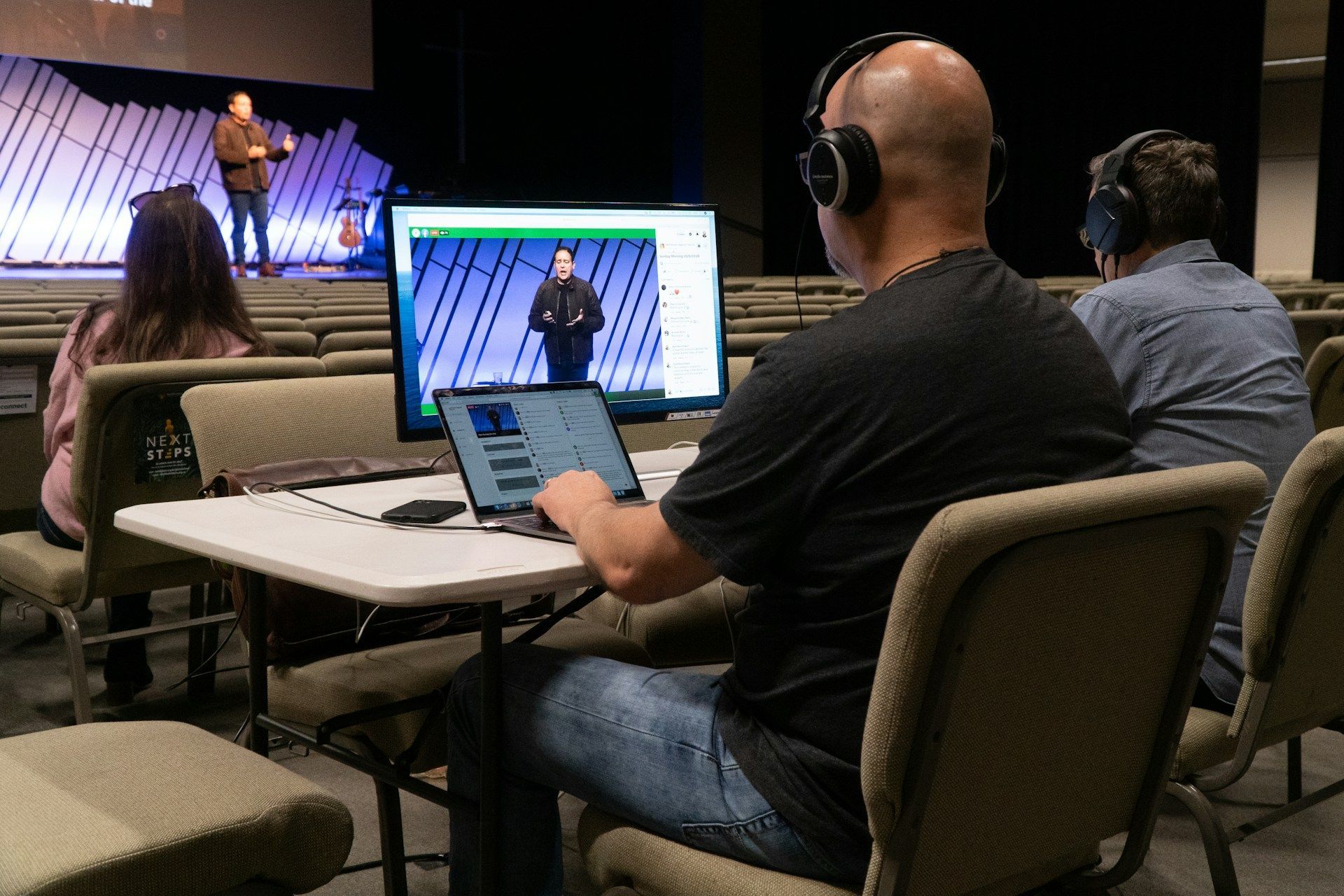Church Website SEO Secrets! | Interview with Mark MacDonald
Jono: Alright, alright, alright. Got Mr. Mark McDonald here with me. Thanks so much for hanging out. We met at that church conference by the good folks over at Tithe.ly and had some fun there, but man, Mark, so tell me about yourself, tell me about your company, be known for something, which is also your book, which is awesome, so tell us who you are, what you do, give us the good stuff.
Mark: First, I think that just because you said Tithe.ly, they should probably sponsor this ad, and
Jono: I don't know. They should sponsor this. Yes. I would say people like you,
Mark: Fox. You contact Dustin, and you tell him that, you know what, we ended up saying Tithe.ly three times, four times, I don't know.
Four seconds. Exactly. Yeah. I'm Mark McDonald and I have this agency that I really focus in on church branding. And it's called be known for something because I think that every person really needs to know what they're known for. But the collection of people called the church, I think that every church needs to be known for something just to get people's attention.
That's awesome.
Jono: That's awesome. And so, you are telling me, tell me where you are right now. You're in,
Mark: I'm in Jacksonville, Florida, but you're Canadian. So, I grew up in East coast, Canada. If you go up I 95 all the way to the top and then hang right, that's New Brunswick. And that's where we're from. And we've been in the States for 22, almost 23 years.
And we, I mean, I love it. I, if I never have another wintry, snowy day ever in my life, I would be perfectly happy.
Jono: Really? So, okay. So, I would be a little bit of the opposite. Now, my, my wife hates cold weather. I hate sweating. I tell her all the time I could totally move to Canada, which then Canadians say, no, you don't understand just how cold it is.
So,
Mark: but I'm like, we, in New Brunswick, we average 10 feet of snow every winter. And yes, the first romantic snowfall that always happens around Halloween it's fun and different. And then by mid-December, early January, you're thinking, okay, so how long is this going to continue? And then by February, March, almost Easter, as things are still muddy and still trying to dry out, it just gets ridiculous.
Jono: Yeah, I can, I can see that. I can see that. I still, yeah, I love snow. I love cold weather. Maybe I just need to go far enough north to get some guaranteed snow a couple times a year, but still, still have a good summer. Maybe, I don't know, but it doesn't matter because my wife can never get warm enough, so I'm not moving anywhere except to hotter weather.
So anyway, so how did you end up, what was then, what brought you from Canada to Jackson to
Mark: the States? Yeah, to the States because we, we stopped by way of Winston Salem, North Carolina. And then we've been in Jacksonville for almost six years now, but I was senior creative director for one of Eastern Canada's largest ad agencies and got to work on some multimillion dollar accounts up there.
I'm a graphic designer. That's what my degree's in. And so, I, I started the agency world and just wanted to be the best designer out there. And then slowly. Climbed my way to the top of this agency that had about 60 people. And what was interesting is that I think everybody does this.
It's like whatever role you play and whoever's your supervisor, you just want to be that supervisor. So, I went from graphic designer and then I just wanted to be an art director. And then as an art director, I just wanted to be a creative director and then creative director, senior creative director, and what was weird in that.
In that trajectory upwards I went from, yeah, visuals really do matter, but the content and what you're saying really matters more because, you know, Jono, you know, someone can, can say, I want the coolest looking, whatever, but if it, if it doesn't communicate the right things, then it's probably not a great design.
Jono: Yeah, so I want to talk about websites, but I Because my brain is a little more technical and I nerd out on, you know, Google stuff and SEO stuff. I'm not a, I'm not a graphic designer. I've dabbled, but I'm always intrigued by guys like you who have the brain and can think through. Through the message and turning, turning that message, turning the message that someone needs to be sharing into a design.
So, like, how do you just, can you give me the, the short, some nuggets on what you guys do, how it starts? How do you not get bogged down? Because most pastors don't think like that either. So, or most, most people, period, don't think like that. I'm not knocking on pastors. So just churches, businesses, everybody.
So, you got to do a lot of
Mark: handholding. So, what do you do? Well, and it's interesting because the whole time that I was working for the big agency, I just kept thinking, so why doesn't the church know this stuff? And, and, you know, I had a great relationship with my church. My, my mom was the, the music person at our church.
She played the piano and the organ and my dad ran the sound system, which I guess today would be a media director. And yeah. And so, we were at the church all the time. And I, as I came up through all the ranks, I went to a Christian school. I just wanted to help the church any way possible. And from the agency world, I kept thinking, so, so pastors would probably want to hear this message.
So, when I would talk to pastors, they quickly went, yeah. No, like we're the church. We don't need marketing. And this was, this was way back in the day you know, 25 years ago. And so that was just frustrating to me. And I just kept thinking like, Lord, please help me some way to be able to use my talents for the church.
And that's why we, we ended up moving to Winston Salem. We took over the Winston Salem. The test kitchen area of the world headquarters for Krispy Kreme Donuts. And so, we, we ended up having a photo studio in the test kitchen area and on a warm day we could smell glaze in our walls, and it was just, it was amazing.
That sounds magical. Yeah, and it's funny because I had never had a warm glazed donut until we moved to the States, and I kept eating these things and thinking they're so light and fluffy. I, I mean, there can't be any calories in them. And then after about a year of doing that, I realized, yes, there are calories.
It messes up with you. It does. But with, with graphic design. So, taking content and converting it over into graphic design, it's, it's, you know, I guess that I quickly go to, I wonder what that would look like, but I think that the step that oftentimes gets missed is How can we improve the content? And many times, all it is, it's just a, to us, it's a three-step formula that we always, we say it constantly at Be Known for Something.
You need to say their name, speak their pain. solutions to proclaim. So, most times when the church speaks, people don't listen anymore, and we've lost our crowd from listening to our content. And so always try to work the name of whoever you're trying to speak to because effective communication rises and falls and how well, you know, your audience.
So, the more, you know, your audience, so that you can say their name, like, if you're going to only talk to young families. So, if you're on the stage and you say, uh, parent of young kids, like, as soon as you say their name, people will look up and engagement. And then if you can speak their pain or speak a pain that you know that they suffer from, they will almost always lean in.
And then in that engagement, if you want to extend it, then solutions to proclaim. Don't start with solutions. And people go I, do I need that? And it's like, then you must work your way backwards. So, you know, for us content is knowing who you're talking to your personas and then knowing what their pain points are, what are their needs, concerns, and goals.
And then how do you create a solution to those needs, concerns, and goals or a path? to the goal so that you're, you're guiding them along to whatever they're looking for.
Jono: That's good stuff, man. I'm probably going to steal that. Hope that's okay. So
Mark: no problem. Do it. In fact, you know, and, and I don't even, we've I mean, Jono and I are, are becoming good friends, but this is really the longest we've ever talked.
But if, if anybody like if you subscribe to our emails I've written, I don't know, a, a ton 830 I think, or our 832 magazine articles that have been published. And, and so if you if you want to receive any of those, just go to beknownforsomething.com/subscribe and just choose podcast as the conference.
Like it'll say what conference and just choose podcast. And not only will you get a weekly article of mine, but you'll also get this, that little jingle in a graphic form that says, say their name, speak their pain, solutions to proclaim, because I think every pastor needs to remember that, and every communications person for sure needs to remember it.
Yeah,
Jono: yeah, I need that on a sticky note, like right here in front of me. That's huge. And, and so. Yeah, so taking that and, and kind of our topic of the day is church websites, because it's, it's tough. Building a website is tough, doing it well, communicating the message on a website, you're trying to talk to people who are not at your church yet, you're trying to talk to people who are already at the church, and so there's always this tension, and you've even got an article on, you know, should I put give in the main navigation that, you know, there, Those are big deals.
You know, should it be given, or should it be planning a visit? Where, where should all this go? And what questions are people asking when they get to the website? So, a couple of things I want to talk, I want to ask you, like, what, what are some of the good things that you see churches doing that they're, they're, you know, they're hitting the bullseye.
This is working well, and they're just really knocking it out of the park. And then, you What are some, some tweaks that churches who are maybe struggling to not doing so well with the website? What are some tweaks that they could make to get there? So, we'll start, let's start with some of the cool things you're seeing, things that are going.
Mark: well.
Yeah, because you just loaded the, the table so that we could talk for a long time about. A lot of different things. And, and I know you bring to the table an awful lot of the expertise here as well. And, and so as, as I'm talking, if you think of something, it's like you at you, let's just like, make it a smorgasbord that that people can just graze on so that they get a ton of tips for sure.
Jono: I'll do my best. You may be giving me too much credit, too much credit, but I'll do my best. No, no, no,
I,
Mark: I, well, Jono, I think the world of you, just in the short time that we've ever talked, it's like, you get it. You, you, you totally understand. And you come from the church world, that ministry world where I know you care deeply for people.
And that's really what it comes down to is that We must understand that, that our website, I mean, it's just a tool and, and if anyone comes to either Jono or myself, we'll give you an answer. It's not the only answer. We just try to make one of our answers. Right? So, when it, when it, when it comes to websites, I can't say this is the way to do it on a website because there are so many people.
that are experimenting with the website. But what I would highly recommend every church to not do is experiment creatively with the UI. And so, the UI is a user interface. It's what, it's what we expect from a website. So, when a website pops up, you just must quickly look at it and go, Oh, wow. It's a website and everyone wants their content as fast as possible.
So that speed, the content is incredibly huge. And if you, if you become creative and try to do something wild and different on your website, and it slows people down, they will hate your website. So, so don't break web paradigm, you know, and paradigm is the rules that are, that are exist and
Jono: all the things that we, that.
That you may think are snazzy and look cool and, and movement and motion and, you know, all the PowerPoint transit, whatever those things are, they may seem cool, but those are the things that millisecond by millisecond slow your website down. Not only to, and Google knows that people don't like that. So, Google you know, that, that penalizes you with Google.
They, they want your website to load in under 1 second because they know if a website takes more than a second to load. People psychologically assume something's wrong with this website and they bounce. And that's literally a metric that Google will tell us is your bounce rate. How, and if you've got a high bounce rate, it means people are getting there and it's too slow and they're, they're taken off to another website.
Mark: So well said. And the interesting thing is that you know, the average person only wants to take about 30 seconds to find the content that they're looking for. They're probably only going to click three times according to the research. So, in three clicks, somebody is going to find what they're looking for.
If you let them find it fast, they will like your website more. If it takes 31 seconds, that's how long it takes for them to call the church and say, I can't find anything on our church website. So, it's just that one little slow down that. that we just must be mindful of. So, if somebody really wants something on your website, then you want to make sure that it's in the main menu.
And that's usually what it comes down to is that churches that are doing it right have a really great short And that organization is kind of like walking up to a filing cabinet and if someone approaches the filing cabinet Jono, you've probably had ministry assistants in the past, and if you hire a ministry assistant and they say on the first day, you know what?
I don't like the way you've been filing things. I'm going to change your whole filing system. We all know that that's like, next to how am I going to fire you? Because you can't find anything. And so, when somebody approaches your filing cabinet for your church, which is online, which we call a website, they look at the main menu as the main drawers of your filing cabinet.
So, the main drawers of your filing cabinet. It must be obvious for whatever they're looking for to be able to find it in one of those main drawers without opening the drawer. So, if, if you know that the average person is looking for an about page, about might be a great thing to have up in the main menu.
That's the easiest way, because they open the drawer, and they find out all about you. Or, you might have it underneath, like, when you, when the, when the drawer opens, when there's a dropdown and there's a listing, then you just want to make sure that the main pages like a, a team page, or a staff page, which is, is really one of the, the most sought-after things on a church website.
It, it, since it's one of those most sought after things. It can either be under the about and you want to try anything that wants to be found faster, needs to be at the top of that list, or it needs to be to the left of the main menu, just because of the way we read across the page from left to right.
So, so you just want to make sure that the hierarchy of your content rises to the occasion in the, in the main menu as well as in the drop down. So. So along
Jono: those lines, what, what are a few of the, you got to have this, this has got to be on the website. What are some of those non negotiables?
Because this is what everybody's looking
Mark: for. Well, and it's interesting because there's, there's two audiences to your website. And, and the key here is that oftentimes. And I, and I assume that somebody has talked loud out there that your website is the front door to your church, and therefore, your main audience of your website is the community, you know, the people who might want to come.
Well, I don't agree with that. If you're using your website as, as you should be using your website, it replaces your bulletin. It replaces your you know, you know, brochures, your folders, like all of that, that stuff gets put into your website. It should be the go-to place for your congregation. So, you have your two audiences, your congregation internal and your community external, but your community, yeah, it needs to be friendly to it.
but your congregation needs to be able to find everything that they're looking for internally. Do you agree with that, Jono? Yeah, yeah,
Jono: absolutely. I think, I mean, sure, we want to make it welcoming and warm, but I tend to think that, I mean, people who aren't at your church yet the community, they're typically checking you out on social media.
They'll end up at your website to figure out what the times and stuff are, but I don't know that they're expecting this, the, the red carpet rolled out on, on the homepage. But yeah, if, if you ever want people to stop asking you every day, emailing what time is this? What time's the ladies event? How do I sign up for this?
You've got to be able to say, go to the website. It's on the website. It's on the website. And eventually. People will trust that unless you're not building the website for them or keeping it up to date for them. And so, if the congregation is still asking that, then either the website's not really designed for them and it probably, and it should be, or they don't trust it because they, they just went to find out what time, you know, the, the sunrise service is for Easter.
and the most up to date information is still the Christmas Eve service times, because no one's keeping the thing up to date. So yeah, I'm on the same page there, 100%.
Mark: Well, and it's, it's interesting, like, as soon as we know, okay, our two audiences, congregation, and community, let's just set community aside for a second, make sure that we get back to that.
As you can probably tell, some days I don't get back to what I think I'm going to get back to. But if you, if we look at the congregation, what is the congregation looking for? Well, the, the research I've, I've looked at a ton of research on this, what they're looking for, the number one thing is service times and a, and a map.
Like, how do I get to the church? How do I, and what time do I need to be at the church? That's critical to them. Number two is, and this scares me when I start number two, because that means I must go to number three. So, number two is that the church team, the staff page is probably number two.
And, and what they're looking for, there's my, my balloons. I'm obviously Started rejoicing inside just talking about a staff page because I love this, the staff page, and the staff page for them, all they're doing is they're looking for who's in charge of something. And how do I get ahold of them? So, if your staff page sees, it got excited for me as well.
So, if your staff page doesn't have prominent, what are they in charge of? And then how do they get, how do I get ahold of them? You got to fix that. Like ASAP. It's really, important to your congregation. And then thirdly, it's events. So how, what's going on? Do I need to register for it? What time is it?
All the details of our, you know, at church service, they mentioned this picnic that's coming up. When is that picnic? They don't need to know all the details in the service, like all that stuff needs to be stripped out of announcements. Instead, it's, oh, well, there's a picnic coming up. We'll just go to the website, and we'll be able to see when the event is.
And so, you need to have either a calendar or an event page or something that, that people can go to, and it needs to be organized. And if it can be filtered, that would be even better so that there's I'm looking for a men's event, or I'm looking for the kids’ event or for a family or for, you know, whatever.
so those three things, if you got those three things, good on a website, you would keep almost everybody happy in your congregation.
Jono: That's funny you say, with number two, when we ever share, especially the first few times we share the metrics or the reports with any of our clients, churches that we're working with, the number two visited page, besides the homepage, is always the staff page.
Or if there's a pastor's page, it's just, just about the pastor. It's that always, and there, they're always surprised by that, but that's a, it's a big deal. And yeah, you've got to get that right and, and make yourself accessible. So, there’s lots of data to back that up that, that, that, that team page, that staff page, leadership page is super important.
And, and along the lines, I would agree about. Again, the, the website needs to be really targeted to your congregation. You can build that, that plan a visit page out. And if you optimize it for search engine for, for Google, basically for search engines, there are others, but, you know, Google's got 90 something percent of the market share.
With, with the FAQs on there, embed a Google map you know, put some good content on the page, a welcome video from someone and, and really optimize that out and then make that the link in your Google business profile on Google that people are naturally going to when they find you, that, that people who are searching church near me or church in Atlanta.
That's the page they're going to land on. It'll also eventually be the page that ranks organically so that people in the community who are looking for your church, we want them to find the plan a visit page. And the people who end up on your homepage, they are the people who are already there. And they can easily find the events, the leadership, all the things that, you know, they're looking.
Mark: for.
Which brings up a great, so what, what a great pivot towards the community. I mean, what is the community when they're searching for a church near me when they get to your website, when asked, so this is the unchurched or the church that, or the church person who is looking for another. When asked, what is it that you are oftentimes looking for?
Remember what number one for congregation was? It was service times and a map for the community. It's. Service times on a map. Woohoo. So, so it's like, oh yeah, I need, I need to know where the church is and what time the services are. How does the breakdown, is there a contemporary services or traditional service?
Like all those things that are, is it multiple campuses? Service times on a map is important to them. Number two is the same again as the congregation. It's, It's the team page. So why are they looking at the team page and the staff page? Not to find out how to get a hold of somebody, but instead it's just purely vanity reasons.
They're trying to say, well, I fit into your church. Do they look like me? And, and oftentimes they'll look around the website, looking for pictures that. You know, like, will I fit in there? Are they all old and I'm young or are they all young and I'm old? And, and in the same sense in, you know, fix up your team page so that you have, what are they in charge of and how do I get ahold of them?
But for the community, make their pictures sing, like just make them as nice as possible, make sure that they're wearing clothes that they can purchase today. I'll let that sink in. Spend some money on a
Jono: good photographer.
Mark: Absolutely. And make sure that they're, they're dressed the way that you expect people to come to your church, what they're wearing. So that somebody, if your main persona is a, you know, a young family and they all look Old, and they're dressed old. People will, people, a young family will not look and go, oh my goodness, that's what we need to dress up like.
Yeah, we're not going there. So, so that those pictures just, they just need to, to look the same as well. And that, that's another thing that anytime that you have on your website, if you have sameness, so it's like a grid, nine people work for us. And they're all quite the same. It's like we, we have a flat organization, as they say.
Then make sure that all the images look the same. What we oftentimes see is that one or two of your images, there'll be someone who you rate up close to the camera, and then other people will be like, you know, it's like the Sesame Street, Grover. Yeah. Close. Right. Far away, you know, that type of thing. And, and so make sure that everybody, one person doesn't stand out because, oh, yeah, they didn't get the memo that they were supposed to dress a certain way.
And, oh, yeah, they weren't here that day. So, they've submitted a picture that doesn't look like anything else is on here. So, you just want everyone. I've
Jono: got the passport photo on there, which is always terrible. It's like passport photos are the worst. So yeah, I know exactly what you're seeing. I've seen that a million times.
Mark: And you want them to look friendly, like, and I know that this is another thing that Jono, we could probably sit and, and talk about for quite some time, but I get to do a lot of mystery visits where churches hire me to come and, and experience as a guest and at first, I thought, Oh my goodness. So, I talked to the pastor and the pastor was like, oh, you're going to love our church.
We're just the friendliest church. It's very rare that I ever go to a mystery visit and feel welcomed. But the one thing that you can control is those are those pictures and the pictures of the team. Sometimes I wonder if they've all been baptized in vinegar or something like each. It just, they don't look friendly.
You just want to make sure that the image is as friendly as possible so that someone would want to walk up to any one of these people and talk to them about spiritual things. That's good. And that that's
Jono: along those lines, I was wanting to ask just kind of the last question, and we've already.
But let's say a church, they don't have the budget for to just completely redo the website. They don't, they can't just dive into a big process of spending a lot to, to rebrand right now. But that's a tweak. That's an easy tweak. Spend a little bit of money on a photographer and really your, your photos can make or break your website in a lot of ways.
And so that's a, I think that's an easy, affordable tweak that any church, small or large, could make. And get a lot of mileage out of it. Are there, are there one or two other tweaks you would, you would say that a church could make without having to just tear down the website and rebuild it, but would go a long way?
Mark: Well, and it's interesting because remember we have our two audiences, internal and external. We did our internal, the three things. The, the third thing on the list of, of what the community is looking for, and it's, it's the next page. So, like, make sure that you get your team page, you know, it's, it's a pretty important piece on both sides, but also you want to make sure as number three for the community is that you must have a great about page.
It can, it can be about us, or it can be about, or it could have you. what we, what we call the thread as, as the, the link, but you need one link that just summarizes who you are as a church. Are you associated with a denomination? What does a regular service look like? Sometimes people would. Will they be killing kittens?
What do I expect? What do I need to expect? Exactly. And that one page just needs to be incredibly SEO rich so that the keywords that are in there if, you know, one of the fun things about SEO is that if you do go to your, on your Google it'll be, you know, Localize, so they know what community you're in.
So when you search for a church near me, or a Baptist church near me, or a Methodist church, or Presbyterian, or whatever, as soon as you get your results page, scroll down just a little bit, and then near the Like, it's usually a just past the fold, you know, the, where you've, where you can't see it on your main browser, but just past that there's oftentimes a section called people who search for this are asking these questions and so it'll list a bunch of questions and those questions would be and.
excellent thing to use verbatim on your about page and make sure that you have a great answer to them. That is 100%.
Jono: That, that, and that, that's SEO right there. Sometimes the answer like, what, what would make Google really like our website and, and show our website? It's right under your nose. Just ask.
Google will fill in the blanks. They'll, they'll start finishing your questions for you with stuff other people are asking and yeah, the, they'll pull those legally asked questions from a website and drop right there, like you were saying.
Mark: Exactly. And, and oftentimes people read those questions and say, yeah, that's not the way we would ask those questions.
It doesn't matter. Cause this, your website is not about you. It's about them. And if them are asking these questions on a regular basis, then you need to be the one that Google loves the way that you've answered that. And then Google becomes your biggest evangelist so that people who might be looking for something Google would use your website to give.
Jono: them the information on Google, on the Google results are linked back to a website that Google liked and pulled that from.
And yeah, you want to be up there. That that's, that's great. That's a good point. I'm glad you said that. I haven't talked about that with anyone, but it's one of those things that like, I think because we work in it every day. It's just, it's, it's kind of natural to us, but it's not to everybody else.
And it shouldn't be, they're not nerds like us in this, but it's such an easy thing that anyone could fix any, any church could add those FAQs to this page and get a lot of mileage out of it. That's good.
Mark: Absolutely. And, and while we're talking a little bit about SEO, I mean, SEO, search engine optimization, Jono's an expert at it.
I mean, talk to Jono. Search engine optimization is the way that people in the community find your website and get it as high up on the page as possible. And, you know, I, I work a little bit in SEO only because, you know, as we're talking about church branding and what a church should be known for, we want, if someone's looking for something and they're Googling it, we want your, your church website to show up in all of that.
And, and the key to all of that is understanding keywords and key phrases. And, and if there's any way, like Jono would love to help you with that. I know when. If somebody goes to beknownforsomething.com/subscribe and you subscribe to our email and you choose in the list on their conference podcast along with that graphic that say their name, speak their pain, solution to proclaim, you'll also get Our, our free tips, the five things that you absolutely have to have right on every one of your pages and it's all you know, honed towards the, the church audience, just to make sure that you have it there.
And then, and the first thing is knowing what keyword your page is all about and make sure that it's in the headline and then make sure it's in the first paragraph, make sure it's in the first sentence of the first paragraph, and that is repeated two or three times on a page.
Jono: That's excellent. So yes, go, go to Mark's website, go sign up for the newsletter, go sign up for everything.
Get in on that. And yeah, and don't forget about SEO. It's, it's, it's huge. And it's where people are 70 to 95 percent of the clicks go to those top search results, not the ads, not the sponsored stuff, but the organic results. And you don't have to give Google any money for that. You just got to figure out what makes them happy.
And so that's good stuff. Well, look, yeah.
Thank you well and weirdly enough it's interesting because everyone wants to fix up their website but if you're not fixing it up the way that google wants you to fix it up then you're somewhat wasting your time so that's that's the value in in talking to someone like you just to make sure that that you're you're not wasting your time your website that you're actually fixing up a website that google will love and that people will find in your community so that more people can find out about jesus and google is not looking for flashy or cool google is looking for easy to use and intuitive and fast and and the happier we make them the more they're gonna show the website to people who are looking and the more that people are going to find your church and if you believe you've got the message they need to hear you've got the gospel to share then they need to find you and we need to be doing everything we can to show up at the top so 100% agree thank you so much for your wisdom i appreciate you being here with me today great stuff well it's the it's the start of the conversation that we're gonna continue even offline and probably for a long time.












